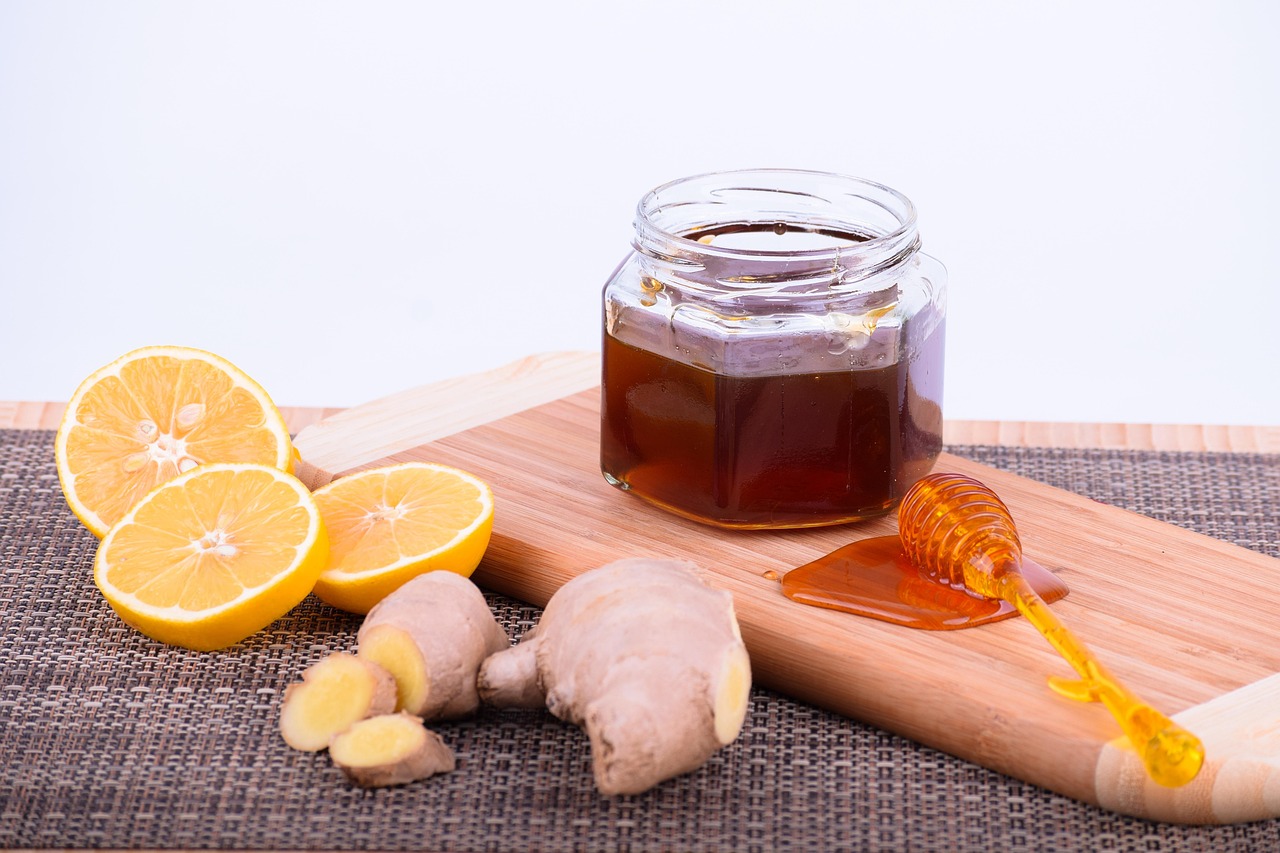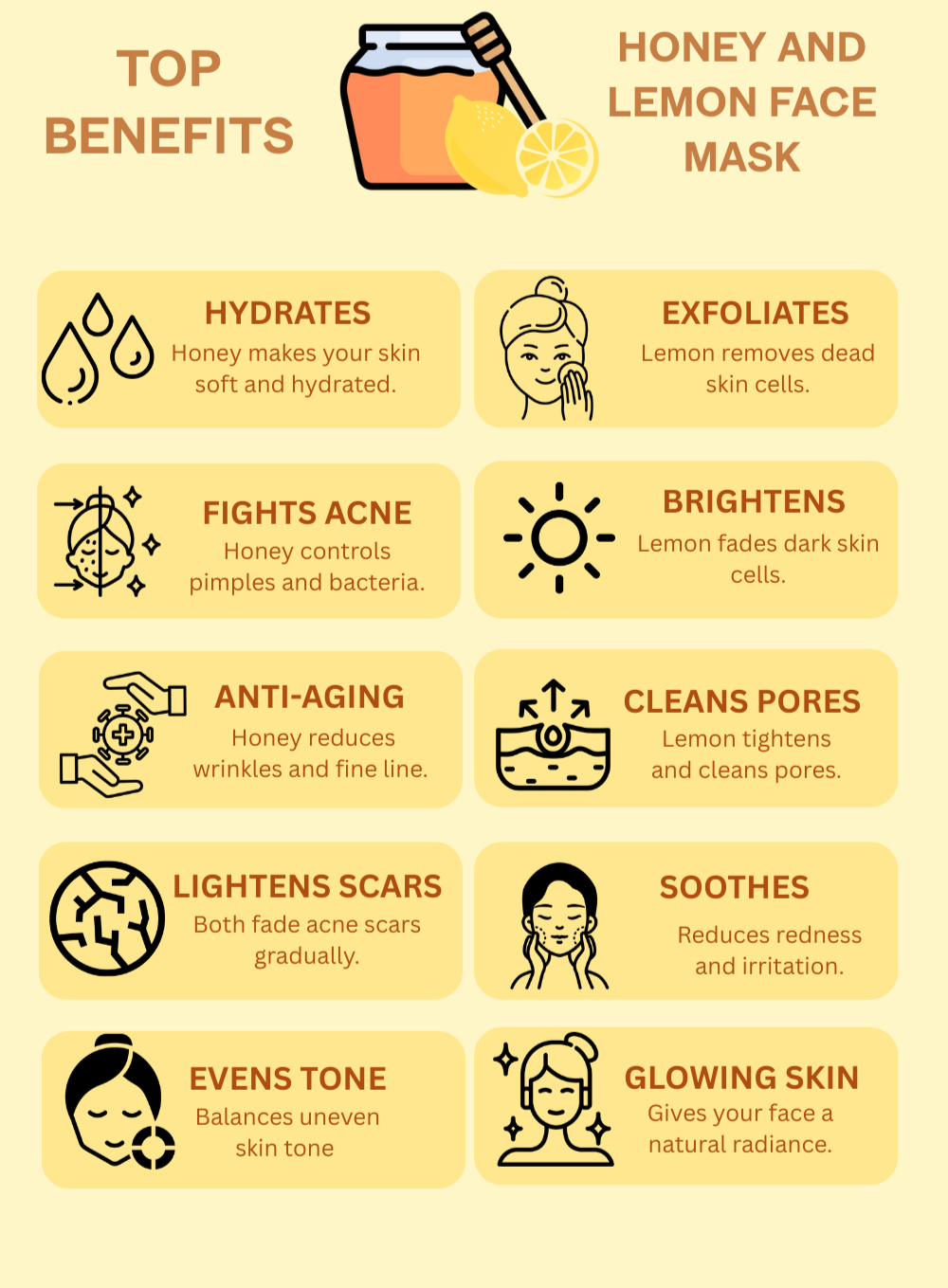
When it comes to skincare, natural remedies often work just as well as store-bought products. One of the most effective and affordable skincare treatments can be made with ingredients already in your kitchen – honey and lemon. This simple mask helps with acne, scars, pigmentation, and dull skin while keeping your face hydrated and glowing.
In this blog, you’ll learn what a honey and lemon face mask is, its benefits, how to make it at home, and safety tips for the best results.
What is a Honey and Lemon Face Mask?
A honey and lemon face mask is a natural skincare treatment made by combining two powerful kitchen ingredients – raw honey and fresh lemon juice. It is one of the oldest and most trusted remedies used in home skincare because of its simplicity, affordability, and visible results.
Honey is known as a natural humectant, which means it helps the skin retain moisture and stay hydrated for longer hours. It also has antibacterial and anti-inflammatory properties that make it effective in calming irritation, reducing redness, and fighting acne-causing bacteria.
Lemon, on the other hand, is packed with Vitamin C and citric acid, both of which are excellent for brightening the skin, fading pigmentation, and gently exfoliating dead skin cells. Its natural bleaching effect helps lighten dark spots, scars, and tanning, giving the skin a more even tone.
1.When combined, honey and lemon work together to:
2.Refresh dull and tired-looking skin.
3.Provide a natural glow without using harsh chemicals.
4.Reduce the appearance of pimples and marks.
5.Keep the skin soft, smooth, and radiant.
This mask has been passed down for generations as a quick, safe, and effective remedy for everyday skincare problems. Whether you are dealing with dryness, acne, or uneven skin tone, this simple mask can be a natural solution.

Honey and Lemon Face Mask: DIY Recipe
Nature offers some of the most effective ingredients for skincare, and the combination of honey and lemon is a timeless favorite. This easy-to-make face mask can help brighten the complexion, combat acne, exfoliate dead skin cells, and provide much-needed moisture, all without harsh chemicals. Nature offers some of the most effective ingredients for skincare, and the combination of honey and lemon is a timeless favorite. This easy-to-make face mask can help brighten the complexion, combat acne, exfoliate dead skin cells, and provide much-needed moisture, all without harsh chemicals.
Ingredients:
1 tablespoon raw honey
½ teaspoon fresh lemon juice
Method:
- Mix honey and lemon juice in a bowl.
- Apply evenly to clean face, avoiding the eyes.
- Leave on for 15–20 minutes.
- Rinse with warm water and pat dry.
- Apply a moisturizer.
Custom Variations for Different Skin Needs
1.Oily Skin
Add: Fuller’s Earth (Multani Mitti)
Reason: Absorbs excess oil + controls acne.
2.Dry Skin
Add: Yogurt (Curd)
Reason: Deeply moisturizes + softens skin.
3.Sensitive Skin3.
Add: Aloe Vera Gel
Reason: Soothes irritation + calms redness.
4.Combination Skin
Add: Oatmeal Powder
Reason: Balances oily & dry areas + gentle exfoliation.
5.Dull / Pigmented Skin
Add: Turmeric
Reason: Reduces dark spots + brightens skin tone.
Safety Tips for Using a Honey and Lemon Face Mask

1. Always Do a Patch Test First
- Why it matters: Lemon and honey are natural, but that doesn’t mean they work for everyone.
- What to do: Apply a small amount of the mask to your inner arm. Wait 15–20 minutes to see if there’s any itching, redness, or irritation.
- Good to know: This is especially important if you have sensitive skin or allergies.
2. Be Careful with Sun Exposure
- Lemon and sunlight don’t mix. It can make your skin more sensitive to UV rays and cause sunburn or a skin reaction called phytophotodermatitis.
- What to do: Use the mask at night or when you’re staying indoors.
If you go outside after using it, wear sunscreen (SPF 30 or higher) and avoid long sun exposure.
3. Use Fresh, High-Quality Ingredients
- Honey: Choose raw, unpasteurized honey for the most skin benefits.
- Lemon juice: Always use fresh lemon juice—avoid bottled or concentrated versions.
4. Use in Moderation
- Limit to 1–2 times per week. More than that can dry out or irritate your skin.
- If your skin is sensitive, use less lemon or mix in extra soothing ingredients like yogurt or water to dilute the acidity.
5. Watch Out for Allergies
- Citrus allergy? Skip the lemon.
- Allergic to bee products? Avoid honey.
- Signs of an allergic reaction include redness, itching, swelling, hives, or rash. Stop use immediately if any occur.
6. Moisturize After Using the Mask
- After rinsing off the mask, splash your face with cool water.
- Wait 30–60 minutes, then apply a gentle, hydrating moisturizer to lock in hydration and calm the skin.
Conclusion
A honey and lemon face mask is a powerful, natural skincare solution that nourishes, brightens, and revitalizes your skin, without affecting your pocket. With just two simple ingredients, you can combat acne, even out skin tone, and achieve a radiant glow. However, using it safely is key: always patch test, avoid sun exposure after use, and choose fresh, high-quality ingredients. By applying it correctly and consistently, this age-old remedy can become a trusted part of your beauty routine for healthy, glowing skin.
FAQs
- Which skin type is Honey & Lemon mask suitable for?
Best for normal, oily, and combination skin. - Can dry skin use it?
Yes, but add aloe vera or glycerin for extra hydration. - How many times a week should I use it?
2–3 times per week is enough. - Can I apply it daily?
No, daily use may cause dryness or irritation. - Is it effective for pimples and acne?
Yes, honey fights bacteria and lemon reduces oil. - Does it make skin fair?
No, but it brightens dull skin and adds a natural glow. - Can I leave it overnight?
No, keep it only 15–20 minutes, then wash off. - Is it safe for sensitive skin?
Use honey alone or with aloe vera; avoid lemon if irritation occurs. - Does it help with dark spots and tanning?
Yes, lemon lightens spots while honey repairs skin. - Are there any side effects?
Possible redness or itching if allergic; always do a patch test.
